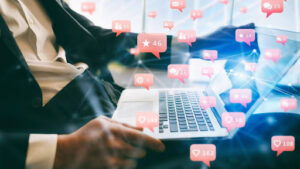In the digital age, the power of a social media like can’t be underestimated. It’s a tiny tap or click, but it’s become a significant part of our online interactions. But what’s the real impact of these little digital thumbs-up?
We’re all guilty of obsessing over ‘likes’. Whether it’s a perfectly filtered Instagram photo or a witty Tweet, we’re constantly seeking validation from our online peers. But there’s more to this story. In this article, we’ll delve into the world of social media ‘likes’, exploring their influence and implications.
From the psychological effects to their role in business marketing strategies, we’ll uncover the true value of a ‘like’. So, let’s dive in and discover what’s behind this small, yet mighty, social media phenomenon.
 Flowing from the preceding discussion, we can assert that ‘likes’ are not just digital thumbs up; they’re powerful messages that can trigger various psychological responses. This section delves into the psychological reasons behind the hunger for social media ‘likes’ and how this triggers certain responses in our brains.
Flowing from the preceding discussion, we can assert that ‘likes’ are not just digital thumbs up; they’re powerful messages that can trigger various psychological responses. This section delves into the psychological reasons behind the hunger for social media ‘likes’ and how this triggers certain responses in our brains.
Social Media Likes
In the context of the digital world, people often embark on a quest for validation. Social media ‘likes’ serve as an endorsement, a stamp of approval from peers. Validation, particularly public recognition, satisfies a natural human craving for acceptance and social belonging. Examples of this include the countless selfies and pictures of daily experiences shared on platforms like Instagram and Facebook, with users eagerly awaiting the ‘likes’.
The quest for validation turns into an obsession for many. For instance, the number of ‘likes’ a post gets is seen as a direct measure of its worth and by extension, the individual’s social standing. This pursuit of validation, driven by the ‘like’ phenomenon, can lead to a constant state of anxiety as users compete for social endorsement.
The Social Comparison Trap
Social media ‘likes’ also contribute to the social comparison trap, another psychological phenomenon. It instigates individuals to constantly measure their lives against others. Posts showcasing success, beauty, prosperity serve as a basis for comparison, with the number of ‘likes’ being the quantifiable parameter.
Let’s take an example. If a user sees their peers garnering more ‘likes’ on their posts, it may lead to feelings of inadequacy and insecurity, fostering a toxic environment of unhealthy competition. Whether we admit it or not, the indomitable trap of social comparison is one of the unhappier side-effects of the ubiquitous ‘like’ culture.
The Impact of Social Media Likes on Mental Health
Social media ‘likes’ wield a potent influence over our mental health, often creating an undertow of anxiety and affecting our self-esteem.
Self-Esteem and Anxiety
With social media ‘likes’ becoming a yardstick for popularity, it plays a pivotal role in dictating one’s self-worth. It’s a fact that individuals, craving for a reinforcement of their social standing, count ‘likes’ on their posts. However, this behavior tends to deteriorate self-esteem when the ‘likes’ fail to reach the desired numbers. This discrepancy can intensify feelings of inadequacy, leading to heightened anxiety.
a reinforcement of their social standing, count ‘likes’ on their posts. However, this behavior tends to deteriorate self-esteem when the ‘likes’ fail to reach the desired numbers. This discrepancy can intensify feelings of inadequacy, leading to heightened anxiety.
For instance, in a study conducted by the Royal Society for Public Health in the UK, it was found that heavy use of social media platforms like Instagram and Facebook significantly amplifies feelings of anxiety and low self-esteem among users.
The Influence on Young Users
The effect of social media ‘likes’ isn’t confined to any particular age group, but young users tend to be particularly vulnerable. The impressionable minds of youth imbibe the idea of ‘likes’ being representative of social acceptance. Consequently, they suffer from ‘Like’ anxiety, which is the constant worry about receiving insufficient ‘likes’, fuelling self-doubt and even leading to depressive symptoms.
One research from the National Institutes of Health maintained that teenagers spending more than two hours a day on social media are more likely to report poor mental health and high psychological distress. A pertinent example of how social media influences the mental health of young users.

